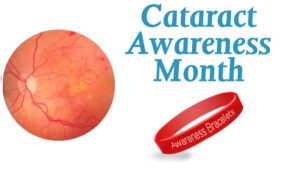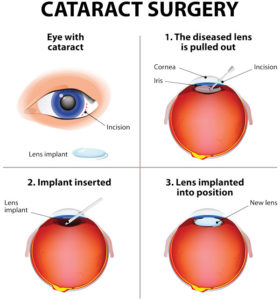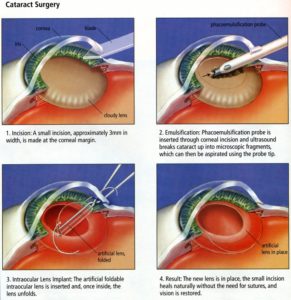Medications that can cause Cataracts:
Certain medications are well-known causes of cataracts, and some drugs can also accelerate their development. Steroid medications – whether pills, injections, or eye drops – are most frequently associated with cataract formation. If you are taking steroid medications to manage a long-term condition, it is important to note any visual changes and to have your ocular health managed by a qualified ophthalmologist. The medications that can cause cataracts include: Corticosteroids, Eye drops containing steroids, Glaucoma medications, Certain antipsychotics and antidepressants, Certain medications for autoimmune conditions, and Medication to control heart arrhythmia
Signs and Symptoms of Cataracts:
You may not have any symptoms at first, when cataracts are mild. But as cataracts grow, they can cause changes in your vision. For example, you may notice that:
- Your vision is cloudy or blurry
- Colors look faded
- You can’t see well at night
- Lamps, sunlight, or headlights seem too bright
- You see a halo around lights
- You see double (this sometimes goes away as the cataract gets bigger)
- You have to change the prescription for your glasses often
These symptoms can be a sign of other eye problems, too. Be sure to talk to your eye doctor if you have any of these problems.
HOW YOU CAN PREVENT CATARACTS:
Maintaining healthy eating habits can help to prevent cataracts in two ways. First, a good diet will control your weight, thus eliminating one of the significant risk factors. Second, increasing your antioxidant intake can also inhibit the oxidation process. In a 2013 Swedish, researchers observed 30,000 women over age 49, and found that those who consumed the highest amounts of antioxidants had a 13 percent lower chance of developing cataracts than those who consumed the least amounts.
To reduce your risk for cataracts, be sure to eat plenty of foods high in antioxidants.
TREATMENTS FOR CATARACTS:
Home treatment. Early on, you may be able to make small changes to manage your cataracts. You can do things like:
- Use brighter lights at home or work
- Wear anti-glare sunglasses
- Use magnifying lenses for reading and other activities
New glasses or contacts. A new prescription for eyeglasses or contact lenses can help you see better with cataracts early on.
Surgery. Your doctor might suggest surgery if your cataracts start getting in the way of everyday activities like reading, driving, or watching TV. During cataract surgery, the doctor removes the clouded lens and replaces it with a new, artificial lens (also called an intraocular lens, or IOL). This surgery is very safe, and 9 out of 10 people who get it can see better afterwards.
Talk about your options with your doctor. Most people don’t need to rush into surgery. Waiting to have surgery usually won’t harm your eyes or make surgery more difficult later. Remember these tips:
- Tell your doctor if cataracts are getting in the way of your everyday activities
- See your doctor for regular check-ups
- Ask your doctor about the benefits and risks of cataract surgery
- Encourage family members to get checked for cataracts, since they can run in families
Latest research on cataracts:
Scientists are studying what causes cataracts and how we can find them earlier and treat them better.



